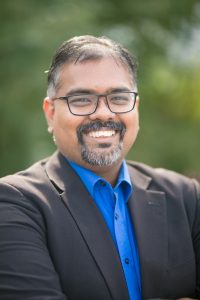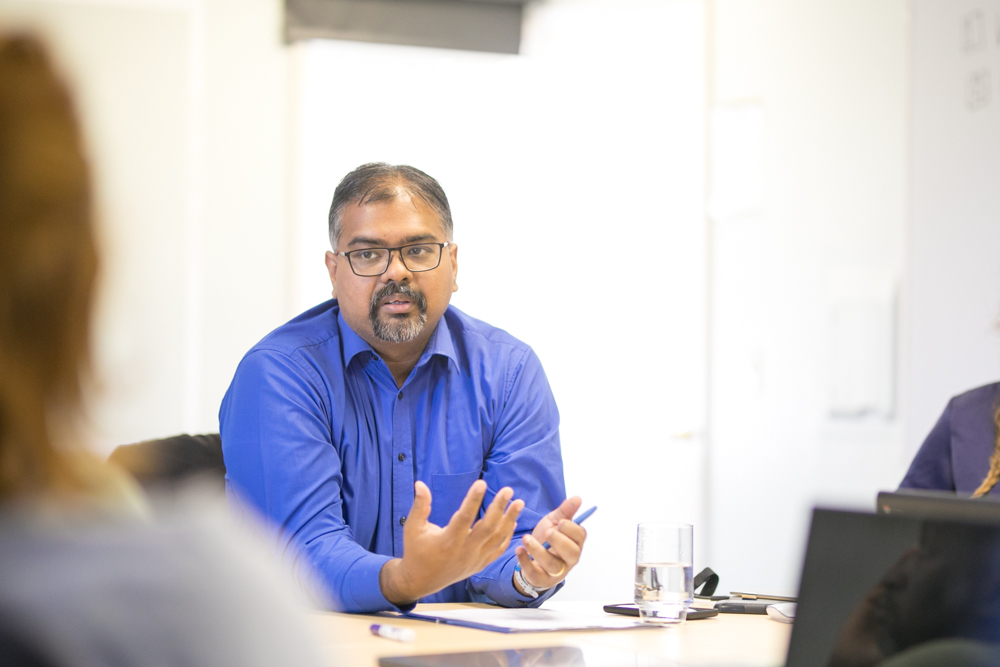Even though the odds against peacebuilding can seem stacked, Theo Sitther, a lobbyist for the Friends Committee on National Legislation (FCNL), has also seen consensus in Washington D.C. – this year, even.
During a visit to campus earlier this month, the 2013 graduate of Eastern Mennonite University’s Center for Justice and Peacebuilding (CJP) – and former senior legislative associate at Mennonite Central Committee’s Washington office for nearly seven years – described a national outlook that is disheartening, to say the least:
Politicians, and the broader population, are becoming increasingly divided on issues; military spending has increased but diplomatic agencies have been left with unfilled staff positions; and the world is experiencing “a massive … ballooning of humanitarian crises,” he said.

And yet in July, legislation that FCNL helped to draft – the Elie Wiesel Genocide and Atrocities Prevention Act – passed the House 406-5 and moved to the Senate, where Sitther hopes it will be passed before the end of the year.
“Engaging with policymakers is absolutely vital to building a more peaceful, more just society, particularly in this moment in Washington,” Sitther told CJP students, faculty and staff earlier this month.
He returned to CJP to speak about his current work and describe opportunities for involvement with FCNL, the largest pro-peace lobbying group in Washington D.C. Those opportunities include its Advocacy Corps, Young Fellows Program and internships, as well as its annual Spring Lobby Weekend, which more than 50 CJP students have attended.
“Theo’s and FCNL’s work has deeply engaged our students in a critical aspect of peacebuilding work – advocacy and lobbying,” said Amy Knorr, CJP practice director. “CJP is grateful for this partnership, and we celebrate our shared values.
Quakers were historically involved in the abolishment of slavery, and founded FCNL 75 years ago to lobby Congress for a more peaceful and just society, said Sitther, which included advocating for civil rights and other causes. Its work on conflict prevention began after Congress authorized the president to invade Iraq 15 years ago.
Back then in Washington, “preventing violent conflict was a foreign concept,” he said, and so FCNL made it the focus of its lobbying efforts. “People didn’t realize that our State Department and USAID could design programs that would actually help work with communities to help prevent violence.”
As a student at CJP, Sitther said, he learned that conflict – in particular, violent conflict – is rooted in complexity, with no simple fixes. Instead, resolving conflicts requires “building mutually transformative relationships,” institutions equipped with training and funding and, perhaps above all, long-term commitment – which often gets lost in short-term election cycles.
But peacebuilding “takes time,” he said – and consensus, which is how FCNL governs itself. It’s a sometimes-messy process, but it serves as a hopeful model for Sitther’s work on Capitol Hill where, he said, dialogue and conversations with people with whom he expects to disagree often exposes agreement.
“Even in the most divisive relationships that you can find, you’re going to find some common ground,” he said. “One of our strategies has been, even where we can find just that ounce of agreement, we stake it out and make sure that we try to grow that common ground.”
The passage of the Elie Wiesel Act, he said, shows the potential for progress, he said – “even in this most difficult political context.”

On this Election Day, 11/6/18, I find this article heartening. Best wishes, Theo! I will pray for your success at influencing Congress for peace.
As a 1967 EMC alum and a Quaker, I delight in your peacebuilding effort. Is there not more potency added to your efforts when citizens who support peacefulness point out bills or committee work that we support?